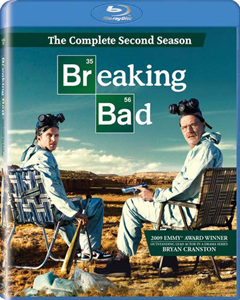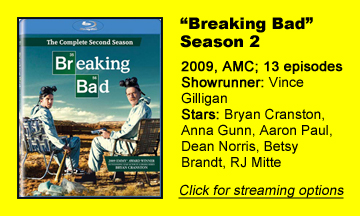Over six Sundays, we’re looking back at the five seasons (and one movie) of one of the last decade’s elite TV series: AMC’s “Breaking Bad.” Next up is Season 2 (2009):
Repeating cycle
In some ways, “Breaking Bad” Season 2 is like an old-school TV series where you can miss an episode and still know what’s happening. A cycle repeats: Walter (the magnetic Bryan Cranston) lies, and Jesse (Aaron Paul) screws up.
As their meth production business takes off in earnest, Walter notes in frustration that every time they take a step forward, they take two steps back. He says this to corrupt Albuquerque lawyer Saul Goodman (the delightful Bob Odenkirk), whose money laundering service both expands their operation and takes another fee out of their earnings.
Season 2 embraces the dark comedy with hour upon hour of Walter being exasperated by Jesse’s latest screw-up, the most memorable of which is “4 Days Out” (episode 9).
Jesse accidentally drains the camper’s battery amid a meth-cooking session in the desert, and they’re on the brink of death from dehydration before Walter sciences the shit out of things to save them.
Meanwhile, I smile every time Walter delivers a straight-faced lie to suspicious wife Skyler (Anna Gunn), who is annoying, sure, but not stupid.
In the season finale, “ABQ” (13), she kicks Walter out of the house, forcing Walter and us viewers to wonder if it’s worth the risk of telling her he has earned the $100,000 to pay his for his cancer treatments via selling meth.
Secret weapon
With tensions between Walter and Skyler rising, it’s crucial that R.J. Mitte remains the heart of the White family and the show’s secret weapon.
As 15-year-old Walter Jr. – now wanting to be called Flynn – Mitte is lovable as a kid who loves his parents and looks up to his dad. It’s on-the-nose yet powerful when Junior tells a TV station about how his dad is a decent person and Walter is forced to reflect on what he’s done in his secret side ventures.
Vince Gilligan and his writing team (including former “X-Files” colleague John Shiban) explore risks in Season 2, as Walter and Jesse experience many narrow successes and escapes.
We meet the large-scale meth dealer for the Southwest region, and he’s a mild-mannered taco-shop owner (Giancarlo Esposito as Gus) – not too different in demeanor from Walter, Saul says. Through his expert caution, he has managed to become rich in the drug trade without getting caught; as far as we can tell, this business doesn’t even cause Gus to break a sweat.
Personal impact
The brilliance of “Breaking Bad,” though, is that we see the personal impact of this lifestyle on Walter; he’d like to be as smooth as Gus, but he’s more like us wide-eyed viewers who are learning about this world. We’re also regularly reminded of the compelling financial reason Walter does it, so we’re totally rooting for all of his lies to pass muster.

This season reminds me of Philip K. Dick’s satirical 1970s drug-warfare-state novels such as “A Scanner Darkly.” A prime example comes in “Mandala” (11), when Jesse wakes up and freaks out over thousands of dollars’ worth of meth having been stolen from his apartment. Walter had told him he was taking the meth, but Jesse was in such a drugged stupor that it didn’t register.
In a broader sense, it’s amazing and amusing that Walt’s brother-in-law, Hank (Dean Norris), is a powerful DEA agent in Albuquerque, yet oblivious to Walt’s activities. Not just a running joke, though, it’s always believable – after all, if your brain can’t conceive of someone being a suspect to begin with, they won’t become one.
Still, Walt and Jesse’s close calls are both tense and hilarious, and they teach viewers about the wider impact of the meth business. “Breaking Bad” continues to give a scathing portrayal of the way the drug war’s attendant corruption snakes through all walks of life.
Butterfly effect
Season 2 even dips into the butterfly effect theory in the finale, when two planes crash above the city as an indirect but clear result of Jesse’s and Walter’s actions and inactions.
And yet, even though I hate what the War on Drugs has done to our country and its citizens, I can’t hate Hank. We too often see that he’s a human being, most notably when he barely survives a sting-gone-bad in “Negro y Azul” (7), which memorably and all-too-briefly guest-stars “Machete’s” Danny Trejo as informant Tortuga. And while I think his job shouldn’t exist, Hank is at least good at it.
As much as I loathe the government’s “solution” to drug use, the problem is undeniable, as Season 2 demonstrates. In the striking “Peekaboo” (6), excellent character actress Dale Dickey plays a meth addict.
Her ravaged complexion and disgusting house are scary enough, but on top of that, she has a literally snot-nosed kid who spends most of his time alone while his parents are getting high.
Jesse’s humanity
When we come down from the absurdist comedy of meth-heads trying to break into an ATM, the final statement is about the humanity of Jesse, who calls the cops to get the kid out of this situation.
Jesse’s addiction quickly comes into play, as does that of alcoholic girlfriend Jane (Krysten Ritter, so perky in “Veronica Mars” and “Gilmore Girls” but showing a depressive side here). Like Jesse and Jane, Walter is addicted, but not to any kind of drug.
Rather, he’s addicted to making big, quick bucks to solve his financial problems. This leads to out-of-character behavior, most shockingly in “Phoenix” (12) when he lets Jane – a potential risk to his operation – choke to death on her vomit rather than help her.
Season 2 inches along in its narrative but ultimately gets us to a point where drug-dealing – and avoiding cops and other pitfalls – has changed Walter’s decision-making process. Skyler can’t live with him any longer, and I suspect Season 3 will explore what Walter needs to do to continue living with himself.


